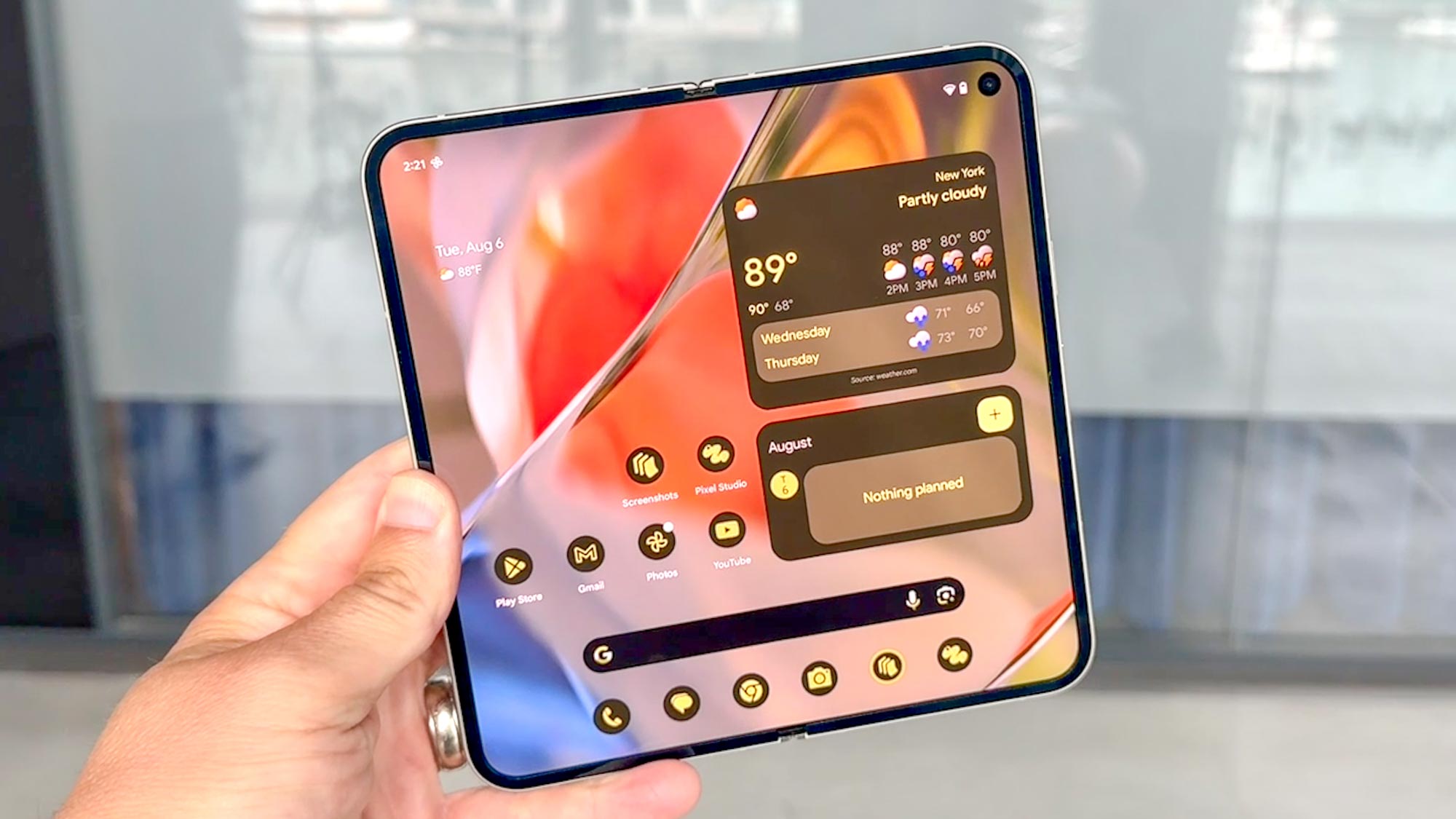
After releasing the original Pixel Fold in mid-2023, Google held off on a follow-up foldable phone until the announcement of the Pixel 9 Pro Fold today (August 13). We'll soon see if the latest model is worth the extra wait.
Google would contend that it is, as launching the Pixel Fold sequel alongside the rest of the Pixel 9 lineup means the new phone can use the same Tensor G4 silicon. That means new AI capabilities that wouldn't have been possible if Google had opted for an older chipset. It also explains why the Pixel 9 Pro Fold has gotten a name change to reflect that it's now a part of the phone maker's lineup of Pro phones.
While AI is a centerpiece of the Pixel 9 Pro Fold, it's not the only highlight. Google also made major design changes to its foldable, including expanded displays and a thinner, lighter design. Google's clearly hoping these changes raise the Fold's status among the best foldable phones.
Here's what we know about the Pixel 9 Pro Fold now that Google's made the new version of the foldable phone official. For our first impressions of the phone, check out our Google Pixel 9 Pro Fold hands-on.
Google Pixel 9 Pro Fold pricing and availability
Google will sell the Pixel 9 Pro Fold for $1,799/£1,749, which is certainly a big chunk of cash, but it's also what Google charged for the Pixel Fold. That's not insignificant, given how prices of phones are rising — even Google's Pixel 9, also announced at Made by Google, will cost $100 more than its predecessor.
The Pixel 9 Pro Fold's steady price also contrasts with the Galaxy Z Fold 6, which now starts at $1,899. So even just by standing in place, Google's foldable phone gains a pricing edge over one of its main rivals in the foldable phone space.
Your $1,799 purchase gets you a phone with 256GB of storage, though you can also upgrade to 512GB by paying an extra $120. Pre-orders for the Pixel 9 Fold are now underway, with the phone shipping on September 4.
Google Pixel 9 Pro Fold specs
Google Pixel 9 Pro Fold design
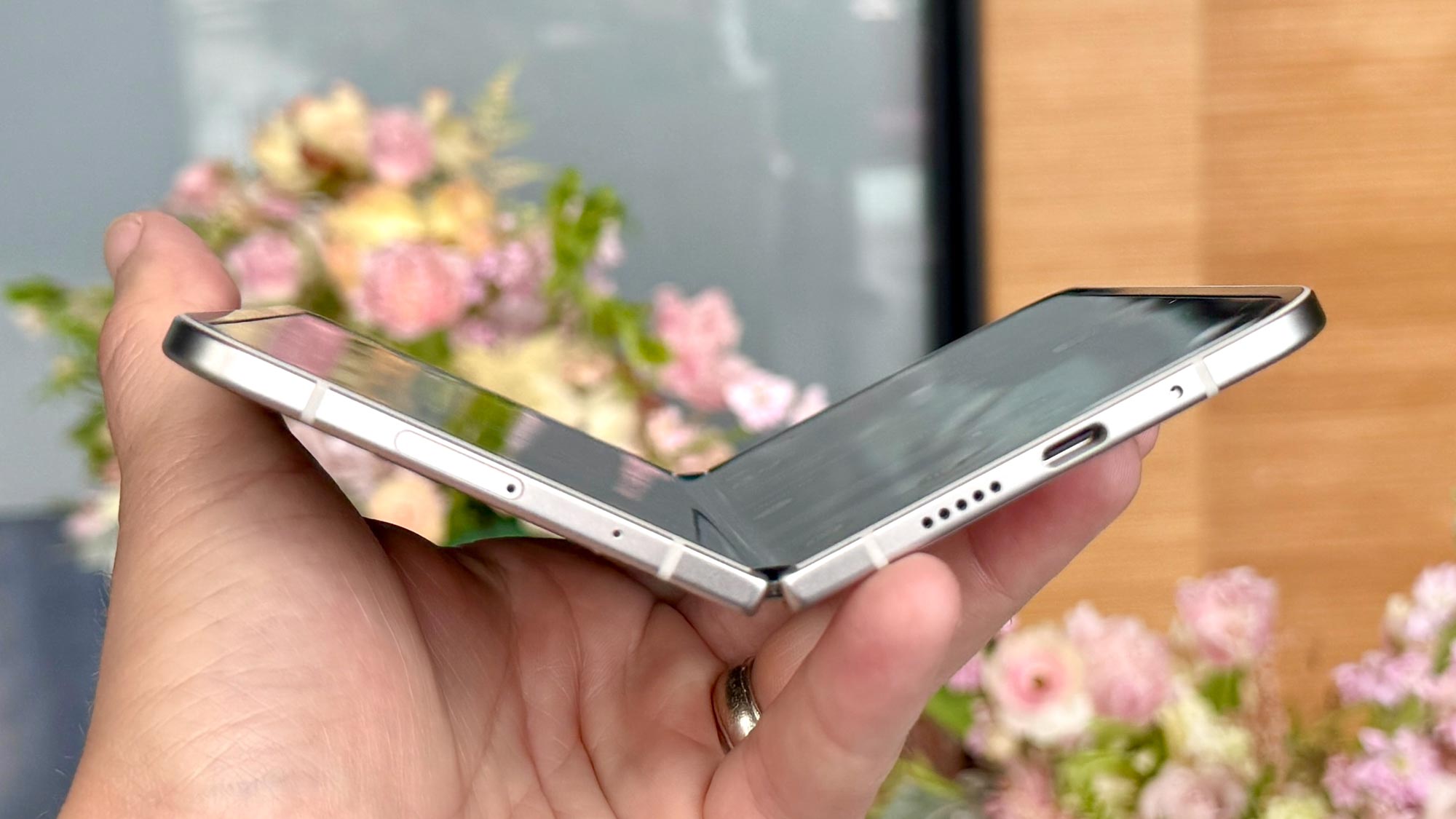
While Google has kept the same basic approach to the Fold's design — you open up the phone like a book to reveal a larger interior display — you'll find some critical changes that result in a thinner phone. Thanks in part to a new hinge design, the Pixel 9 Pro Fold measures 5.1mm thin, which shaves 0.7mm from the Pixel Fold's thickness. It also makes the Pixel 9 Pro Fold thinner than the Galaxy Z Fold 6, and thinness was one of the big selling points for Samsung's new foldable.
The original Pixel Fold topped the scales at a hefty 10 ounces. The Pixel 9 Fold Pro certainly isn't as lightweight as the 8.4-ounce Galaxy Z Fold 6, but at 9.1 ounces, the phone is lighter than before.
The fluid-friction hinge is also supposed to improve durability, though the Pixel 9 Pro Fold features the same IPX8 rating as its predecessor. (Don't worry about a dunk in 1.5 meters of water, but stay on guard against dust.) Google uses matte back with a metal frame, reminiscent of the materials used in other Pixel 9 Pro phones.
If there's a departure for the Pixel 9 Pro Fold from the rest of the Pixel 9 Pro lineup, it's that the foldable ditches the back-spanning camera bar. Instead, the rear camera lenses are stacked on top of each other in a rectangular array.
The Pixel 9 Pro Fold's color options are more limited than what you have with the Pixel 9 Pro. You choose between either Porcelain (white) and Obsidian (black).
Google Pixel 9 Pro Fold display
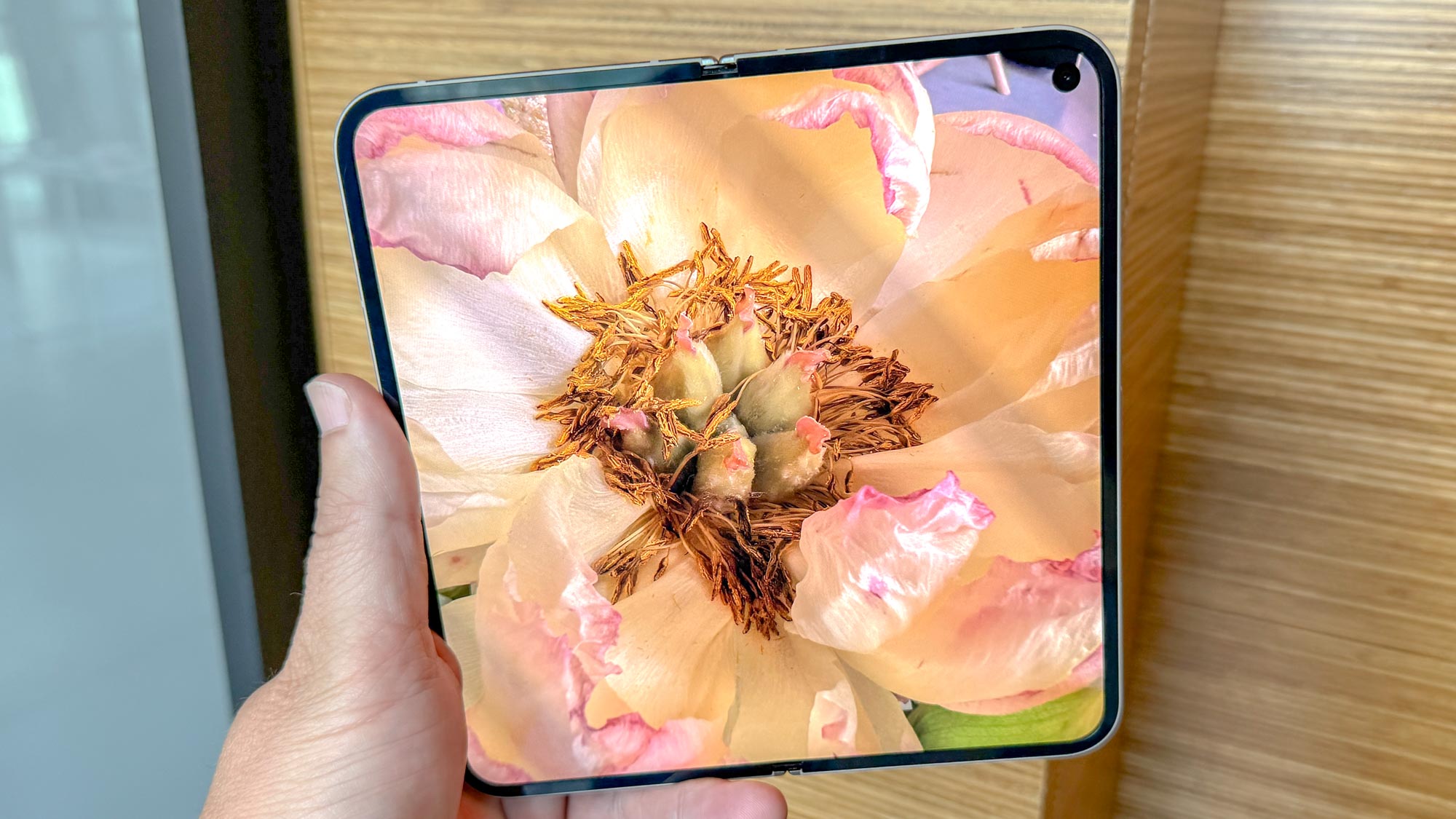
Design changes extend to the interior and exterior displays on the Pixel 9 Pro Fold as well. The external display is now 6.3 inches — the same size as the Pixel 9's screen — instead of the wider 5.8-inch cover screen on the Pixel Fold. We felt the wider aspect ratio on the Pixel Fold's external screen gave that phone an edge over other foldables, so we're interested to see if the new cover panel proves to be as functional.
Another change comes to the interior display, as Google has shrunken down the bezels of that screen, giving you more display real estate to work with. The Pixel 9 Pro Fold's main display measures 8 inches — that's the largest panel of any phone, foldable or otherwise.
The screens on the Pixel 9 Pro Fold aren't just bigger compared to the Pixel Fold, they're also brighter. Both external and internal screens are rated for 2,700 nits of maximum brightness. In the case of the main screen, that would translate to an 80% improvement over the Pixel Fold's display.
Google Pixel 9 Pro Fold cameras
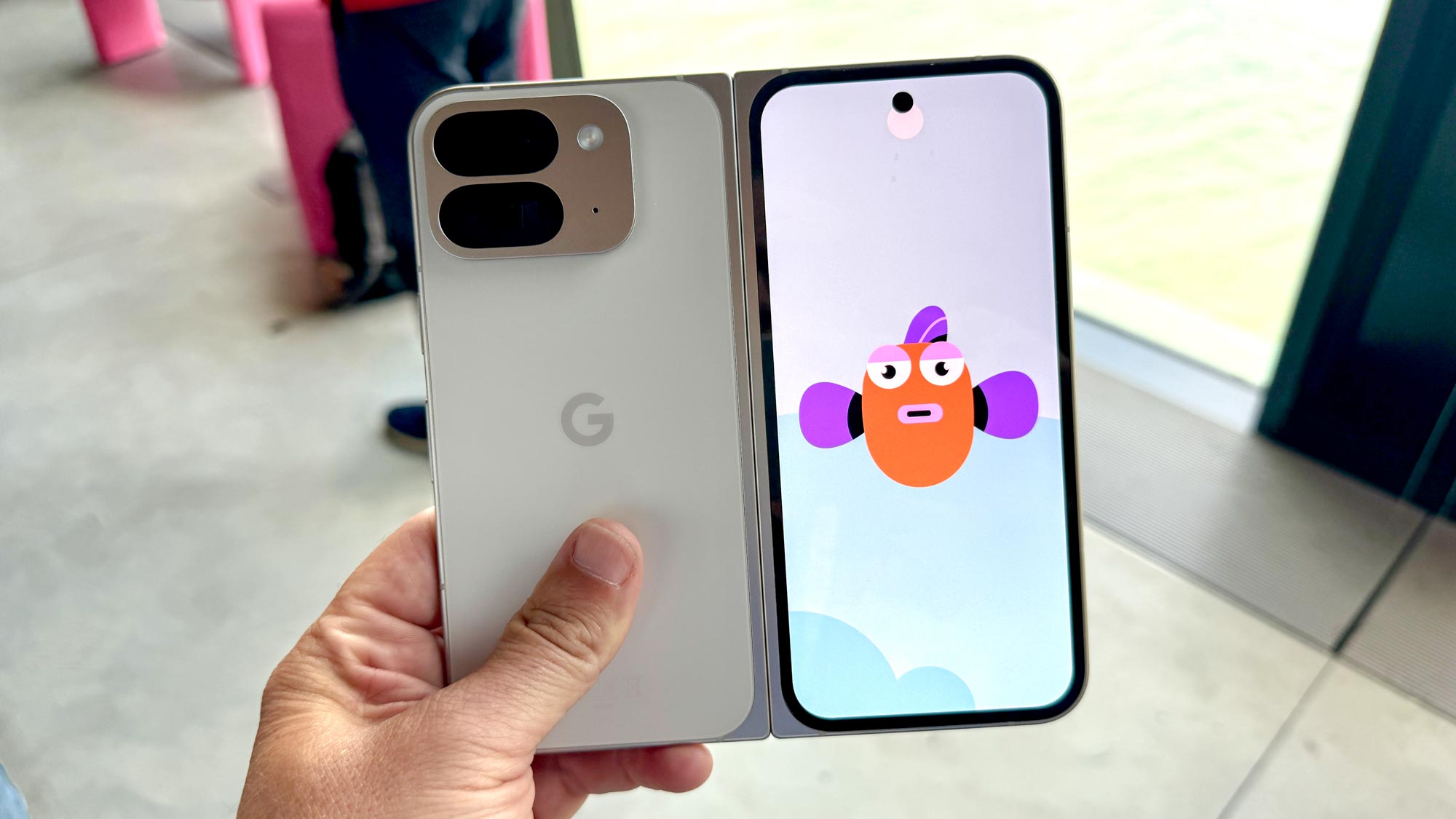
Don't look for big changes from the Pixel Fold's camera setup. The ultrawide camera sensor on the Pixel 9 Pro Fold takes a slight step down in terms of resolution to 10.5MP — the Pixel Fold used a 10.8MP sensor — but the 48MP main camera and 10.8 telephoto lens return. That telephoto camera supports up to a 5x optical zoom, using Google's Super Res Zoom feature for digital zooms up to 20x. Up front, the Pixel 9 Pro uses a 10MP camera, as opposed to the Pixel Fold's 9.5MP selfie cam, while the inner cam on the interior display jumps to 10MP from 8MP.
Rather than improved hardware, Google has put its focus on new camera features. For example, a Made You Look feature puts animations on the Fold's external screen when you're photographing kids with any of the rear cameras — the idea is that they'll be looking at the animations when you take the picture, thus ensuring they'll be looking at the cameras.
If the Pixel 9 Pro Fold cameras are going to shine, it'll be through software features. Google promises features like Night Sight video for capturing footage when the lights are low, with AI helping to reduce the noise. Speaking of AI, the Pixel 9 Pro Fold also gains a feature coming to other Pixel 9 models called Add Me. You'll be able to take a group shot with the foldable phone's cameras, and then hand the camera phone off to someone else, as AI guides you on where to stand for a second shot. The Pixel 9 Pro Fold's photo processing then combines the two photos into one so that you're now part of the group shot.
Google Pixel 9 Pro Fold Software and AI features
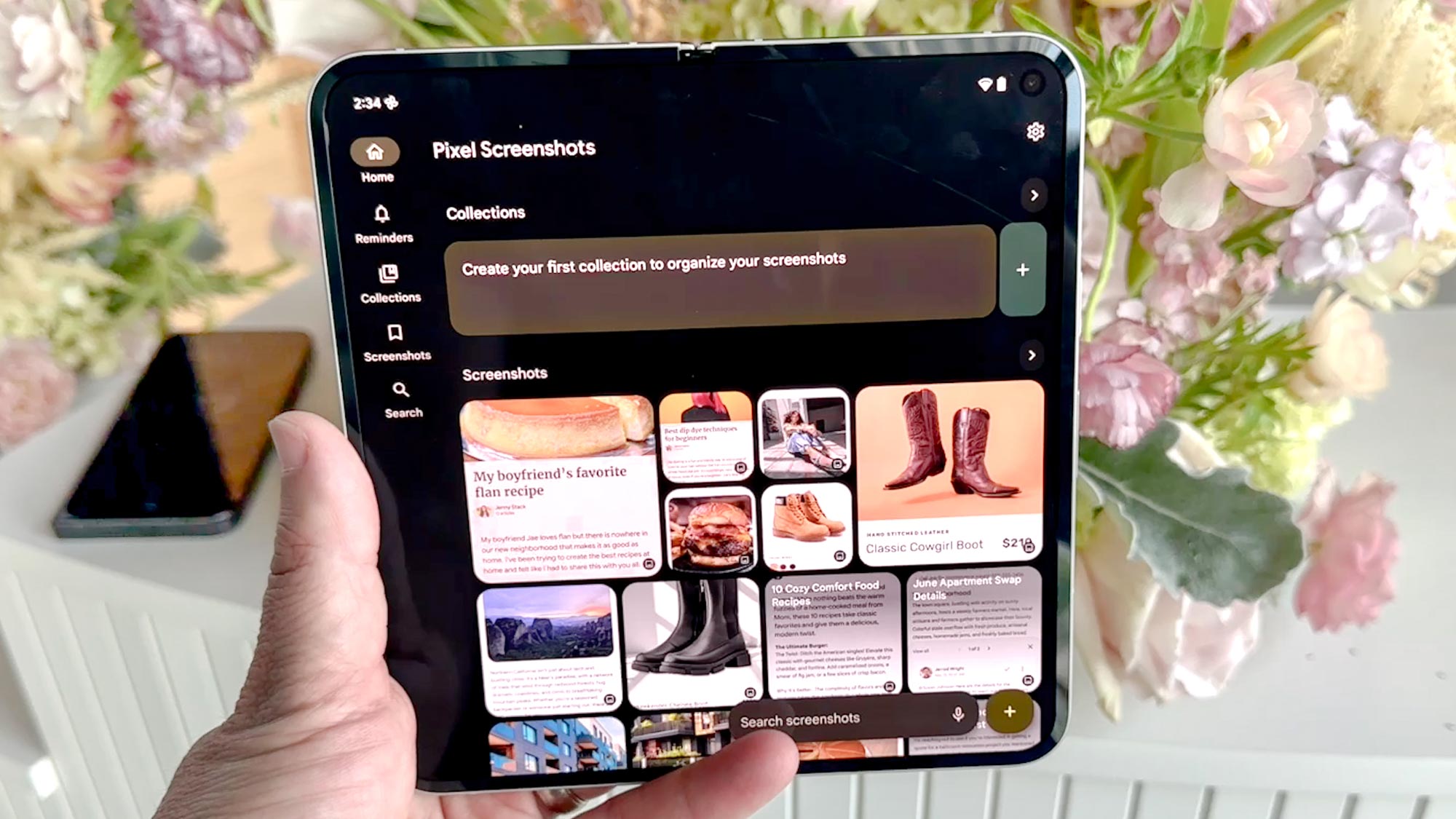
AI features powered by the Pixel 9 Pro Fold's Tensor processor — more on that in a bit — are a big part of the foldable's software features. But Google is also making sure to add capabilities that take advantage of the Pixel 9 Pro Fold's large interior screen. For example, YouTube picks up a multiview feature that allows you to watch up to four videos at once on the Fold's display.
When you hold a Google Meet video conference call on the Pixel 9 Pro Fold, callers can appear on both of the phone's screens, so you can include more people in the discussion. On a similar note, Google Translate uses both of the Fold's screen so that you and the person you're speaking with can see real-time translations, matching a feature Samsung offers on its foldable phones.
Still, AI figures to be the focus of the Pixel 9 Pro Fold's software features, with this phone picking up many of the same tricks found on other Pixel 9 phones. That includes built-in Gemini for helping you with tasks like writing and managing your calendar. As with other Pro models, Fold owners get a free year of Gemini Advanced.
The Pixel 9 Pro is able to search for screenshots based on whatever content they contain — which is handy for tracking down log-in information. You can also record phone calls and get a transcript of the conversation that Google's AI can summarize for an easy-to-skim record of what you discussed on the call. There's also a Pixel Studio tool for generating images with text prompts.
Google has expanded software and security support for its phones to seven years, and that extends to the Pixel 9 Pro Fold. That also includes Pixel feature drops over the course of those seven years. You won’t get Android 15 on the Pixel 9 Pro Fold just yet, as the phone ships with Android 14. Expect a software update from Google soon.
Google Pixel 9 Pro Fold performance and battery life
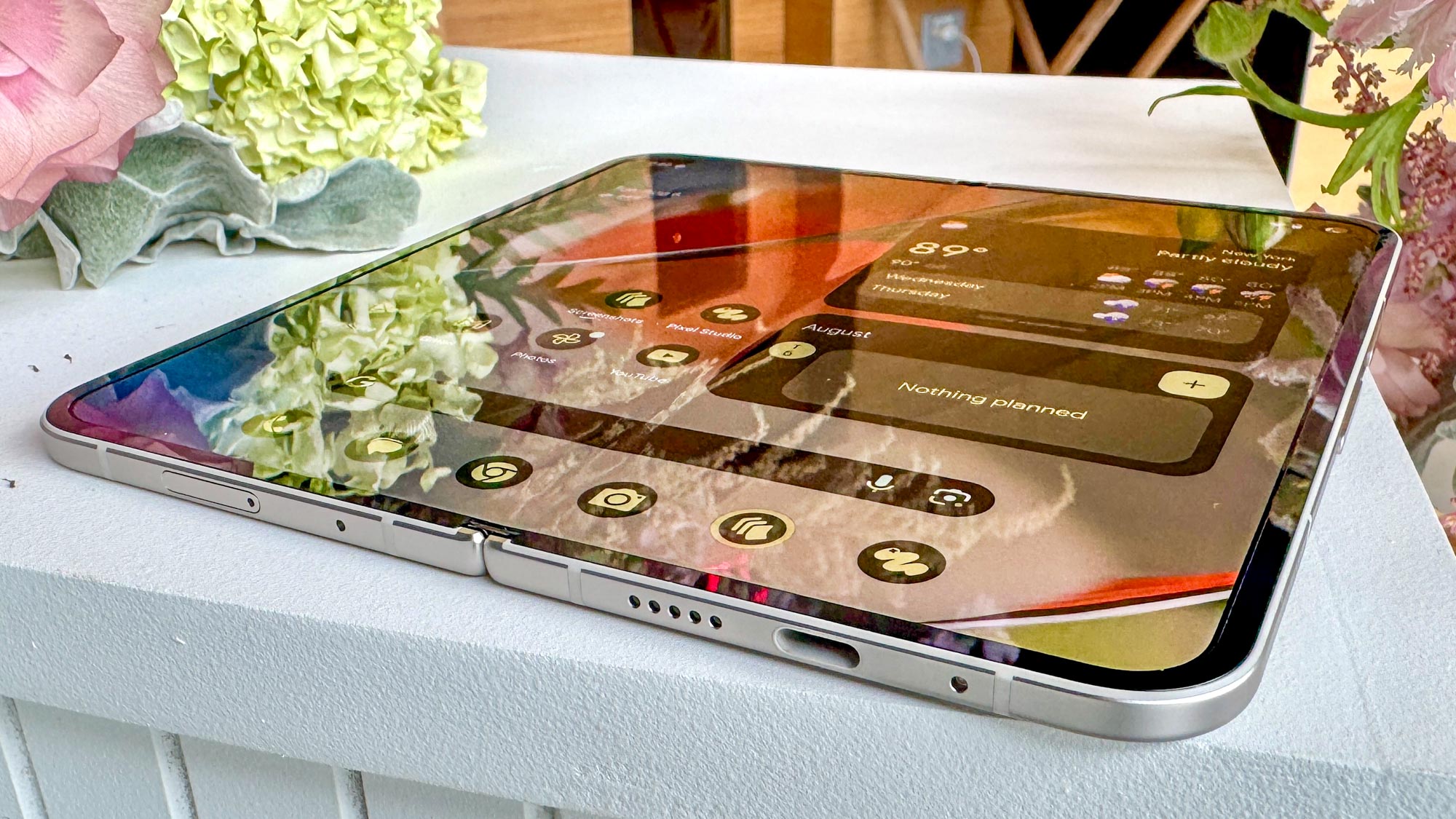
The Tensor G4 powers the Pixel 9 Pro, and while that system-on-chip's primary focus figures to be supporting the new AI features, we are expecting to see big gains over the Tensor G2 found in the original Pixel Fold when we benchmark the phone. That said, the G4 figures to have a hard time matching the performance of the Snapdragon 8 Gen 3 found inside the Galaxy Z Fold 6, even with the 16GB of RAM the Pixel 9 Pro Fold now offers. (The Pixel Fold had 12GB.)
The Pixel 9 Pro Fold picks up a feature that's part of the rest of the Pixel 9 lineup, at least in the U.S. Satellite SOS will let you send text messages with your location to contacts, even if there's no cellular or Wi-Fi connectivity. Google plans to offer that connectivity for two years, and it's looking to expand the feature to other countries.
The battery size in the Pixel 9 Pro Fold is actually smaller than what the Pixel Fold offered — 4,650 mAh compared to 4,821 mAh. Barring big improvements to power management on the Tensor G4 — hey, it's possible — that bodes ill for the Pixel 9 Pro Fold's prospect of exceeding the Pixel Fold's performance on our battery test, even with Google listing identical battery life specs for both of its foldables.
One area where we can expect improvement is in charging speed — the Pixel 9 Pro Fold supports 45W wired charging. That's an upgrade from the 30W speeds on the Pixel Fold.
Google Pixel 9 Pro Fold outlook
We'll be spending some more time with the Pixel 9 Pro Fold, testing out its multitasking and AI capabilities to see how it compares to devices like the Galaxy Z Fold 6 and OnePlus Open. Keep an eye out for our full review with test results for performance, battery and display.







